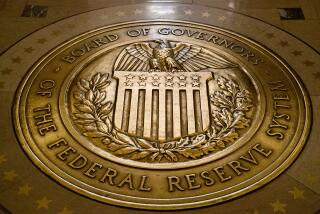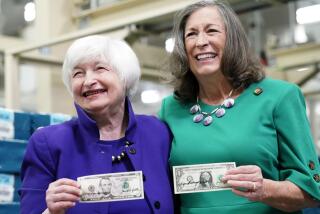UC Economist Seen as Clinton Choice for Fed : Economy: Berkeley scholar Janet L. Yellen is described as soft-spoken, unpretentious and highly respected.
- Share via
President Clinton is expected to pick Janet L. Yellen, a soft-spoken, UC Berkeley economist whose interests range from the behavior of youth gangs to labor markets, to fill one of two vacancies on the Federal Reserve Board.
Her nomination could come by the end of next week, sources said Thursday. Yellen was traveling in Connecticut and could not be reached for comment.
Yellen, 47, has worked as a Fed economist and taught at Harvard, the London School of Economics and the University of California, Berkeley, where she is a professor of business administration. She and her husband live in Berkeley with their 12-year-old son, Robert.
“It’s not easy to pigeon-hole her,” said Andrew K. Rose, a Berkeley colleague who has collaborated with Yellen on papers about Germany and other topics. “She has enormously broad interests.”
Nonetheless, the Brooklyn-born academic is viewed more as a liberal thinker, concerned with unemployment, than a conservative “inflation hawk.” She is a protege of Yale economist James Tobin, who has criticized recent interest rate hikes by the Fed.
One of Yellen’s colleagues, worried that fervent, anti-inflation advocates might be uncomfortable with her, sought to allay their fears: “People should not assume from her writings that they know what kind of policy advice she would give in a different context and at a different time,” said the colleague, who asked not to be identified.
But at least some observers wondered whether the well-liked professor, known to stroll through Berkeley in khaki pants and maroon sweaters, is the most appropriate choice at a time when inflation anxieties are rocking the financial markets.
“In a recession, Yellen would be a great choice, but on the verge of an overheating, it may not be the best choice,” Rudiger Dornbusch, an economist at the Massachusetts Institute of Technology, told Reuters.
The Fed has raised short-term interest rates three times this year in a bid to head off inflation--and fears of inflation--sparked by the growing economy.
The two Fed vacancies give the White House a limited chance to modify the central bank’s priorities in favor of more growth. Alan Blinder, a Princeton University professor who is No. 2 at the White House Council of Economic Advisers, is likely to be nominated for the post of vice chairman. Both appointments require Senate approval.
A Berkeley colleague described Yellen as highly respected and unpretentious. Her casual tastes are echoed by those of her husband and scholarly collaborator, George Akerlof, a leading economist who is also on the Berkeley faculty.
“George and Janet walk around wearing virtually identical clothes,” Rose said.
Yellen, twice named teacher of the year at Berkeley’s Haas School of Business, is not an aggressive “Wall Street type” but rather “a sweet, nice person who’s great at forming a consensus,” he added.
“You can have disproportionate influence if you can persuade people through your personal style and the force of your intellectual arguments,” Rose said. “I think she’ll be very effective at that.”
White House officials, concerned that the recent surge in interest rates could jeopardize the economic recovery, said Thursday that inflation is not a significant danger.
Chief White House economist Laura D’Andrea Tyson said the extraordinary 7% growth rate gauged in the last quarter of 1993 was magnified by onetime events, such as rebuilding of farm inventories after the Midwest flood.
The true, underlying growth rate for the three-month period was a more moderate 4%, she said.
Like Tyson, who also taught at Berkeley, Yellen believes federal policy can rectify some of the undesired consequences of a free market, such as joblessness or pollution.
For example, Yellen and her husband wrote in 1991 that the problems of eastern Germany required dramatic government intervention, notably large wage subsidies and major infrastructure investment.
*
Times staff writer David Lauter in Washington contributed to this report.
More to Read
Inside the business of entertainment
The Wide Shot brings you news, analysis and insights on everything from streaming wars to production — and what it all means for the future.
You may occasionally receive promotional content from the Los Angeles Times.










